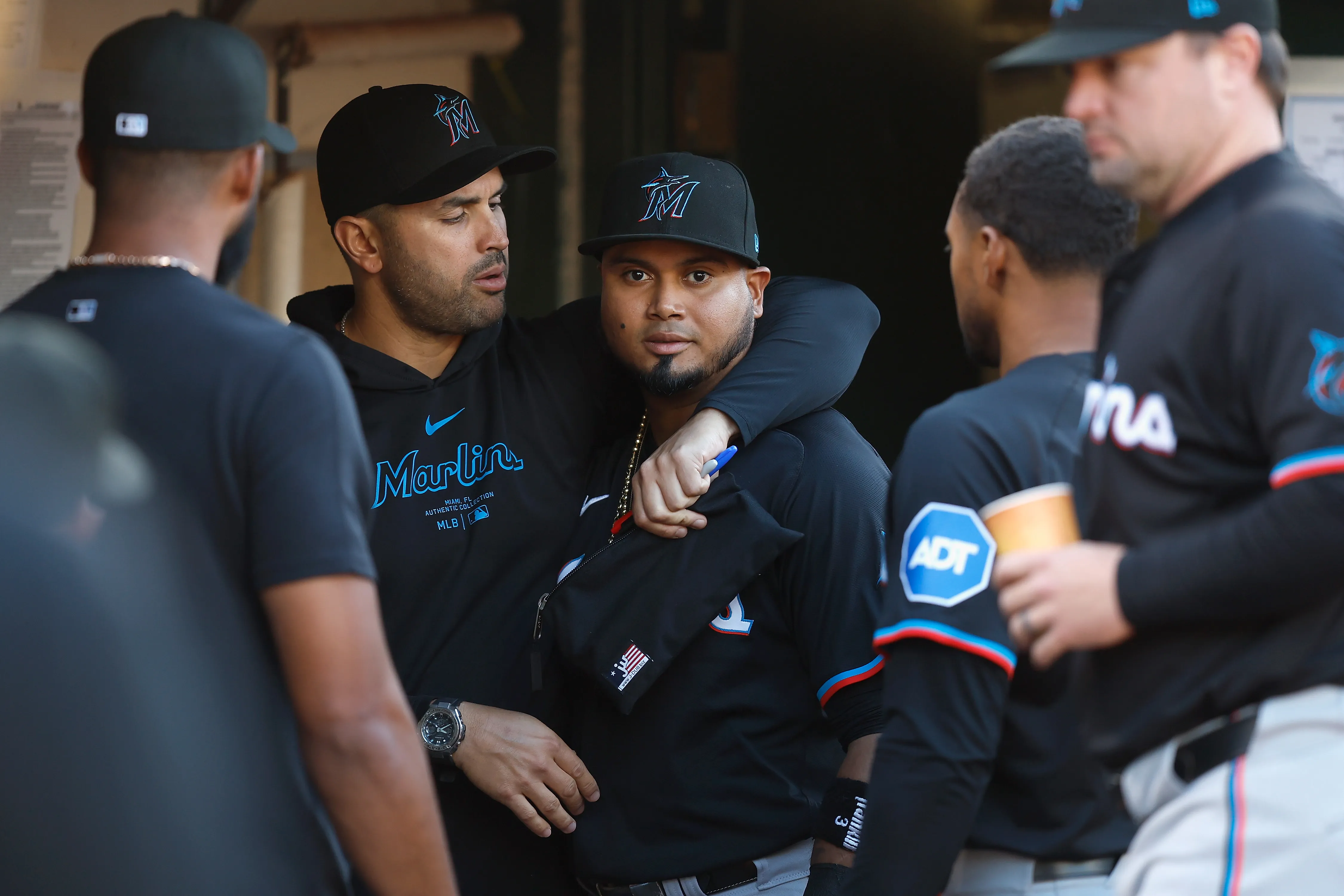
Larry Bowa and Ryne Sandberg have had a brotherly relationship ever since they played in the same Chicago Cubs infield in the early 1980s. When Sandberg became Phillies manager two years ago, he insisted that Bowa be his bench coach.
But even as close as they are, Bowa had no idea that Sandberg was going to resign three weeks ago.
“It caught me 100 percent off guard,” said Bowa, commenting on his friend’s departure for the first time in an interview with CSNPhilly.com. “I didn’t want it to end like that for him. He never hinted he was going to walk away. It was like a bombshell for me.”
In a hastily called news conference just hours after informing upper management of his decision, Sandberg cited losing and impending changes in club leadership as his reasons for resigning with more than a year left on his contract. One of those changes could ultimately have been Sandberg himself. There were signs that he would have been let go after the season in a purge that will likely include general manager Ruben Amaro Jr.
Those who got to know Sandberg during his time as Phillies skipper have privately theorized that there was more to his decision than he let on. In his autobiography, written more than 20 years ago, Sandberg talked about how he’d become fed up with the modern player. They lacked his work ethic, accepted losing too easily and had a general sense of entitlement that didn’t sit well with the old-school, grind-it-out Hall of Fame second baseman. During his time as Phillies skipper, Sandberg saw too much of this. It also did not sit well with him that players did not respect authority the way they used to. During his year-plus as Phillies manager, Sandberg was publicly disrespected a number of times by players. Maybe he was partly to blame for some of the incidents because he didn’t communicate with his players strongly enough when problems first started. Whatever the case, the lack of respect gnawed at him and it just became time to walk away.
"Ryno told me he went to Cole Hamels' charity function (the day before he resigned) and everybody was saying, 'Hang in there, keep grinding,'" Bowa said. "He said he had a good time. He said he went home that night, woke up at 4 in the morning and said, 'I'm done.' That’s what he told me."
Bowa went on to give his opinion on a number of the reasons — some confirmed by Sandberg himself, some theorized — behind his friend’s decision to resign.
MLB
Handling veteran players
Bowa went through it when he managed Steve Garvey in San Diego. It’s not easy phasing out respected veterans for younger players.
“I think the fact that Ryno had three or four guys that have had tremendous careers and now they’re trying to incorporate youth with the experience,” Bowa said. “Ryno never said anything, but here he is trying to balance everything and get guys playing time. It’s hard to deal with guys that have had tremendous careers and, not phase them out, but draw them back a little bit, tell them they’re not going to play 150 games. That’s hard to do. And you’re not talking about Joe Schmoe players. You’re talking about guys who’ve established themselves as big-time players in Philadelphia.”
On changes in upper management affecting him
Sandberg resigned three days before Andy MacPhail was named Pat Gillick’s successor as club president.
“Ryno said he knew that whoever came in, the whole situation was going to be evaluated,” Bowa said. “He said when you’re a manager, if we lose games, writers are going to say, ‘Well, how do you think your evaluation is going?’ and he told me I just didn’t feel like answering that every day.
“He kept saying there would be new management and he didn’t like the fact that he’d have to prove himself with a team that wasn’t at the top of its game. It’s hard to prove what you are when you go to battle every night when the opposing team, on paper, looks real good.”
The respect factor
Several pitchers — Hamels, A.J. Burnett, Kyle Kendrick and David Buchanan — openly disrespected Sandberg during visits to the mound last season.
Bowa said Sandberg addressed that with the pitchers in spring training.
“That was one issue that bothered him,” Bowa said.
There were issues this season, as well. Cameras caught Chase Utley chastising pitching coach Bob McClure during a relief appearance by Jeff Francoeur last month in Baltimore, and Ken Giles showed up the manager and got an earful in return in Pittsburgh.
“Ryno knows Utley is intense and all that,” Bowa said. “But what made him mad was Frenchy said, ‘Hey, I can pitch two innings.’ I’m sure if Chase could do that over again he wouldn’t do that. He was looking out for Frenchy. But Ryno couldn’t believe it after talking with Frenchy and him saying he could go two innings.”
As for the Giles incident ...
“It shocked me,” Bowa said. “I’d never seen him that mad. I was like, ‘Whoa, who’s this? Who just came out of his body right here?’ ”
A half-season of frustration?
“I’m sure it was,” Bowa said. “I’m sure it was."
Bowa added, “Giles is a great kid; he got caught up in the moment and he was concentrating on the hitter.”
But for Sandberg, “That was sort of the straw that broken the camel’s back,” Bowa said. “He went over and said, ‘I’m running this team. If I want to put that guy on, I’m putting him on. I’m the manager, you’re the pitcher.’ ”
Was that one of the moments that led to Sandberg’s decision?
“Maybe,” Bowa said. “Maybe.“
Sandberg managed six years in the minors. By all accounts, respect (or lack of) was never an issue.
"I think when you manage in the minor leagues you don’t get that because those guys haven’t reached their peak and they’re still, 'I better be careful here because I know these reports are going in and I don’t want a bad mark on my report card,'" Bowa said.
"Ryno liked the teaching part. I’d see him out there working on double plays with Cesar (Hernandez) and he loved it. But when you’ve got veteran guys who’ve had great success there’s really no teaching there."
Work ethic
“When Ryno came up, I thought he was going to be a good player,” Bowa said. “But did I think he was going to be a Hall of Famer? No. He worked. A lot of Hall of Fame guys have natural ability. He had the ability and he worked. I think he thought if he worked that hard, why can’t everybody work that hard? He was shocked at not everybody, but some guys that were on the fringe. He’d look at them and say, ‘Why don’t you work harder?’ That bothered him a lot.”
Did he have fun?
He was so low-key, so undemonstrative, that it was tough to tell.
“I think he had fun from 7 to 10 o’clock,” Bowa said. “I don’t think he liked — and this is just me — all the, ‘Why this? Why that?’ I think he liked to compete from 7 to 10. I think he liked trying to put the team in position to win. Not once did he say, ‘I don’t have a lot of ammunition here with the exception of Cole Hamels every fifth day.’
“He thought he could take this team, even though we were short, to a higher standard. And he knew we were short. He never came in the coaches’ room and said, ‘Are you kidding me? This is what we’ve got right now?’ He’d say, ‘How can we win this game tonight?’ And he really believed that when the game started. But when the game started and you’re down seven runs, it just becomes hard.”
In the end, there was no one reason for Sandberg’s decision.
There were a variety of factors.
“I think this left a sour taste in his mouth,” Bowa said.


